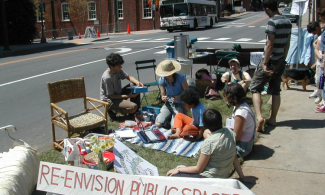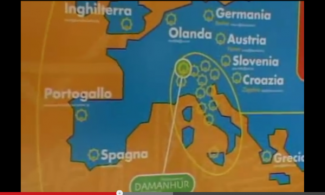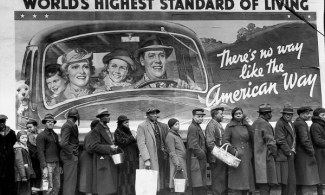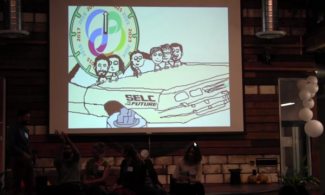
Originally published at Shareable
Challenges and strategies for anti-capitalist community design (part 1)
Capitalism isn’t just an economic system we live inside. It is a culture that lives inside of us. It influences our psychology, how we design our communities, how we relate to each other, the kind of culture we create, and what’s possible for us to do together.
Capitalism is one of the most harmful aspects of mainstream society and is deeply entwined with white supremacy, patriarchy, colonialism, and imperialism. Societies, including micro-societies like intentional communities (ICs), are a mixture of structures and culture, and economies are a key aspect with implications for both. Capitalism is a structure that encourages individual finances and embeds commodification and transaction into our relationships with each other and the world around us. This fosters and reinforces a culture of hyper-individualism, privacy, competition, objectification, and entitlement. It creates an experience of separation, isolation, loneliness, and fear, and normalizes inequality, oppression, exploitation, and violence.
ICs are idealistic responses to the problems of society. We see and experience the harm caused by human civilization on people and ecosystems. We want to live in a way that is more healthy and satisfying, where we can have a different relationship to people and place. We want lifestyles that align with our values and help make the world better. But as much as we want something different, we are susceptible to recreating the problems we want to solve.
It’s all about sharing
At their core, ICs are about sharing. As places for sharing lives, resources, land, and purpose, they provide and maximize an interconnected set of ecological, social, and economic benefits. ICs integrate aspects of our lives that are usually kept separate. The experience cultivates belonging and accountability, which inspires us to act from a deep understanding of our interdependence. ICs are spaces that allow for experimentation and learning about ourselves, relationships, culture, and systems in a unique way.
The more we share, the more opportunities we have to practice.
An essential task we face as a species is to learn how to share resources equitably, democratically, and peacefully, within the bounds of what our ecosystems can support. But sharing is hard. Mainstream society does not prepare us for living in community, and we don’t magically know how to do it simply by stepping into it. We underestimate how deeply the culture of capitalism is ingrained in us, and the extent to which we make choices that are antithetical to our desires for community.
Because of the trauma and enculturation, the lack of experience and availability of alternative models, as well as the unavoidability of operating within capitalism, the gravity will always be towards capitalist ways of doing things. Unwittingly trying to live our values using capitalist vehicles makes things more complicated and less satisfying, but we don’t understand why.
Alternatives that would align better with our values, but would involve being more economically entwined, if we are even aware of them, are mostly rejected at the outset for reasons we don’t fully explore. Even if we understand the benefits intellectually, we have to believe that it’s possible, and that it’s worth the risk and discomfort to do the work to create an experience of it.
The problems with capitalism
(I offer this brief analysis as a basis for what I’m advocating. Please see the references section for more in-depth works on the subject.)
When I say capitalism, I don’t mean the use of money as a medium of exchange for goods and services, which is separate from and predates capitalism. I’m talking about the modern, dominant, global capitalist economy, largely established and perpetuated by the US and Europe starting around the industrial revolution.
Inherently unsustainable and unjust
Capitalism revolves around capital, defined as “anything that confers value or benefit to its owners, such as a factory and its machinery, intellectual property like patents, or the financial assets of a business.” It is based on a central mechanic: The control and investment of capital to make a profit, which is then reinvested to make more profit, and so on.
A system designed around the perpetual generation of profit depends on infinite growth. This growth comes from the extraction and exploitation of natural and human resources. Infinite growth is fundamental to capitalism, but the resources needed for this growth are finite, which makes this system inherently unsustainable.
Capitalism perpetuates inequality because it relies on it. There must always be people who rely on wage-earning jobs. Through their labor, these people create value for those who own the means of production. This owning class can make money by doing nothing more than investing money. In this system, wealth will tend to consolidate into fewer hands, who will have an outsized influence on government, causing it to pass laws designed to benefit them, which are protected by the threat or use of violence and imprisonment by the state. This is inherently unjust.
Capitalism has become what it is today because of imperialism, colonialism, genocide, and slavery. It is based on laws protecting private property ownership, which are based on racist, dehumanizing ideologies like the Doctrine of Discovery, and the subjection of nature characterized by mechanistic philosophy. A core assumption embedded deep in our collective psyche is that I should be able to do whatever I want with my property regardless of how it impacts others, and that I should get to keep people off my property even if there are people who don’t have access to the basic resources they need to survive.
All wealth is stolen or based on stolen wealth: it is accumulated by some at the expense of others and in ways that are unsustainable for the ecosystems on which we all depend with no possibility for meaningful accountability.
Scarcity and competition are built into the financial system. Money is created when debt is issued, but the money needed to pay the interest is not created, which means there is always more debt in the system than there is money. Any amount of wealth we gain comes at the expense of someone else, and some people will always lose the game regardless of how well they play.
Internalized capitalism
Capitalist culture is highly aligned with what are widely discussed as the characteristics of white supremacy culture, and we internalize it in various ways.
We subconsciously believe that we deserve to be where we are in the class structure, are entitled to whatever level of wealth we have access to, and that if someone makes less money than us it’s because they haven’t worked as hard.
One of the central deceptions of the American Dream is the idea that anyone can make it. While it may be true that anyONE can make it, this is unconsciously interpreted to mean that EVERYone can make it, which is not true. But this drives people to unrealistically pursue success in capitalism and even defend it against their own best interests.
Capitalism tells us, “You’re not enough,” “There isn’t enough,” “You’re alone,” “You’re not safe,” and any problems or failures we experience are because there’s something wrong with us. It ingrains a connection between production and our sense of self-worth, and turns busyness and material accumulation into badges of honor. It exacerbates our tendency to compare ourselves to others and see ourselves as separate. Everything is seen through the lens of private ownership and its monetary value as a commodity in a marketplace, including our own identities, extending into the need for “personal branding.” Cooperation is portrayed as risky, inefficient, and counterproductive to the goal of individual security.
Capitalism robs us of our ability to get along and our sense of belonging. It’s no accident that it’s hard for us to be vulnerable, to trust each other, that we’re emotionally fragile, terrible communicators, and conflict-avoidant. We weren’t raised knowing how to work things out with each other or even to feel comfortable being close. But more than that, we’re traumatized by the lack of connection and belonging we experienced growing up. That trauma interferes with our ability to experience belonging by making us avoid or even sabotage situations that would foster it but are unbearably uncomfortable.
Capitalism is designed to keep us separate from each other so that we can be the best consumers we can be. It trains us paradoxically to operate in a hyper-individualistic way within a system that we are utterly dependent on for survival. An increasing majority of people around the world do not have the skills or access to resources for self-sufficiency. We don’t have access to the social or practical skills to be able to get along with each other, nor the resources to have a reasonable shot at collective self-determination.
The only game in town
There is no way to avoid participating in capitalism. To whatever extent ICs create a semipermeable membrane that allows for an internal self-sufficient economic system that operates differently from capitalism, the community and its members still have to make some amount of money.
Since it’s the only game in town, if we’re to have any hope of creating systems that disrupt it, we need to know how to play it, regardless of the moral dilemma that represents. This includes understanding financial and business management and dealing with the baggage we have around money because of our class background and financial circumstances.
What are we going for?
It would be wonderful if people could simply live lives that do no harm to the world. However, in society’s current state of oppression and exploitation, death and destruction, there is no neutral ground, no option to “step to the side, live well, and be absolved.” To some degree we have no choice about whether we participate in capitalism. But we do have a degree of choice over how much we work against it and create alternatives.
Ultimately the question is, what are we going for with this crazy thing called intentional community? What do we want? What do we think and say we want but find deeply uncomfortable and don’t actually pursue? What would we actually find satisfying if we did the work? How do our choices support or undermine that?
Active resistance to harmful systems is crucial. Creating alternatives that meets people’s needs outside of harmful systems is also crucial. And this needs to happen at scale. If we don’t seek to affect change in the world at a scale that can have a meaningful impact on the direction society is heading, even alternative systems will get run over. At some point simply creating nice places to live that buffer against the worst of mainstream society will no longer be tenable.
Sharing is an important part of the strategy. In our struggle with capitalism, sharing is power. Leaning into greater sharing, and being in solidarity, can generate greater capacity. This can be used to make our ICs more supportive and accessible, and can be leveraged to support the equitable and democratic development of just and regenerative local and regional social, governance, and economic systems. This will require getting comfortable with being uncomfortable, letting go of whatever sense of entitlement we have, and leveraging whatever privilege we have for collective benefit.
It’s not just that it is in our self-interest to participate in this effort, it is our moral imperative.
This is the first in a three-part series by Sky Blue. The next parts will cover the economies of intentional communities and key-choice points for building ones.
Header image by Sky Blue via In Community.





Add new comment